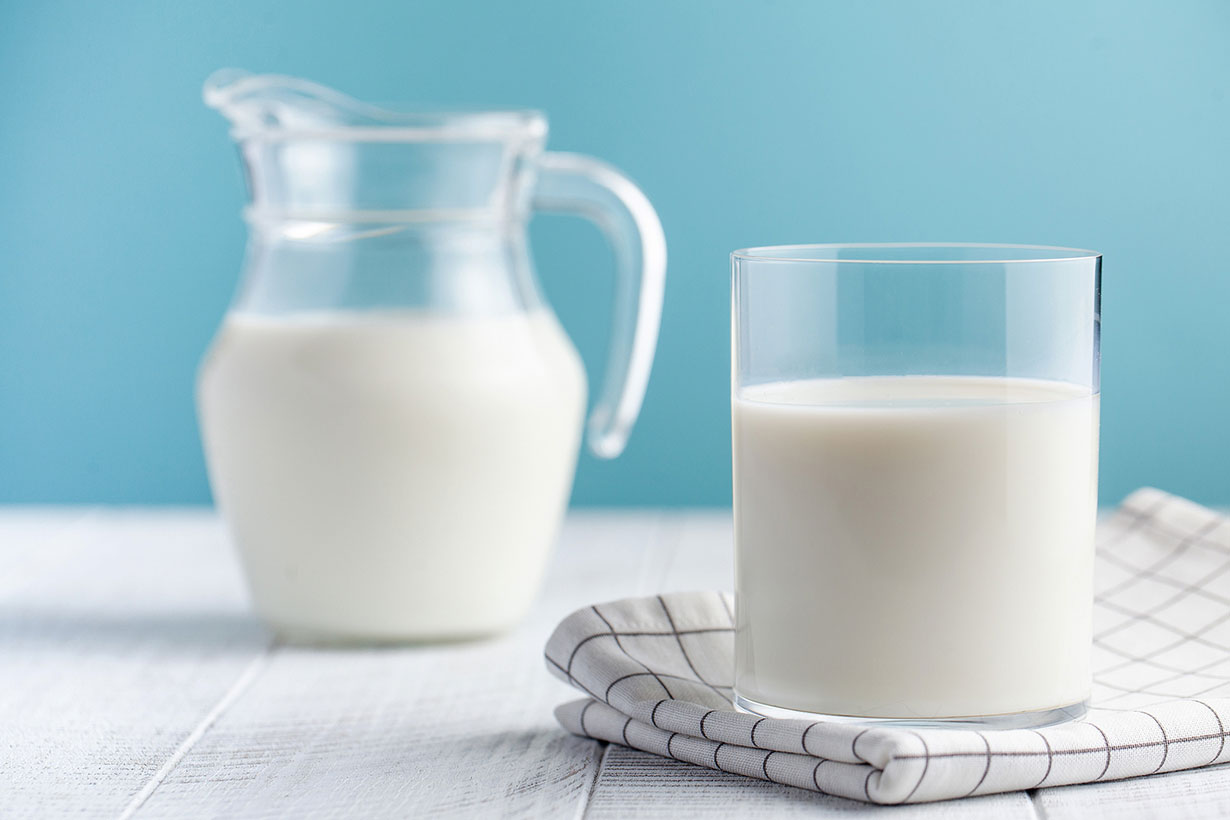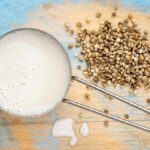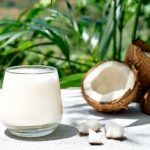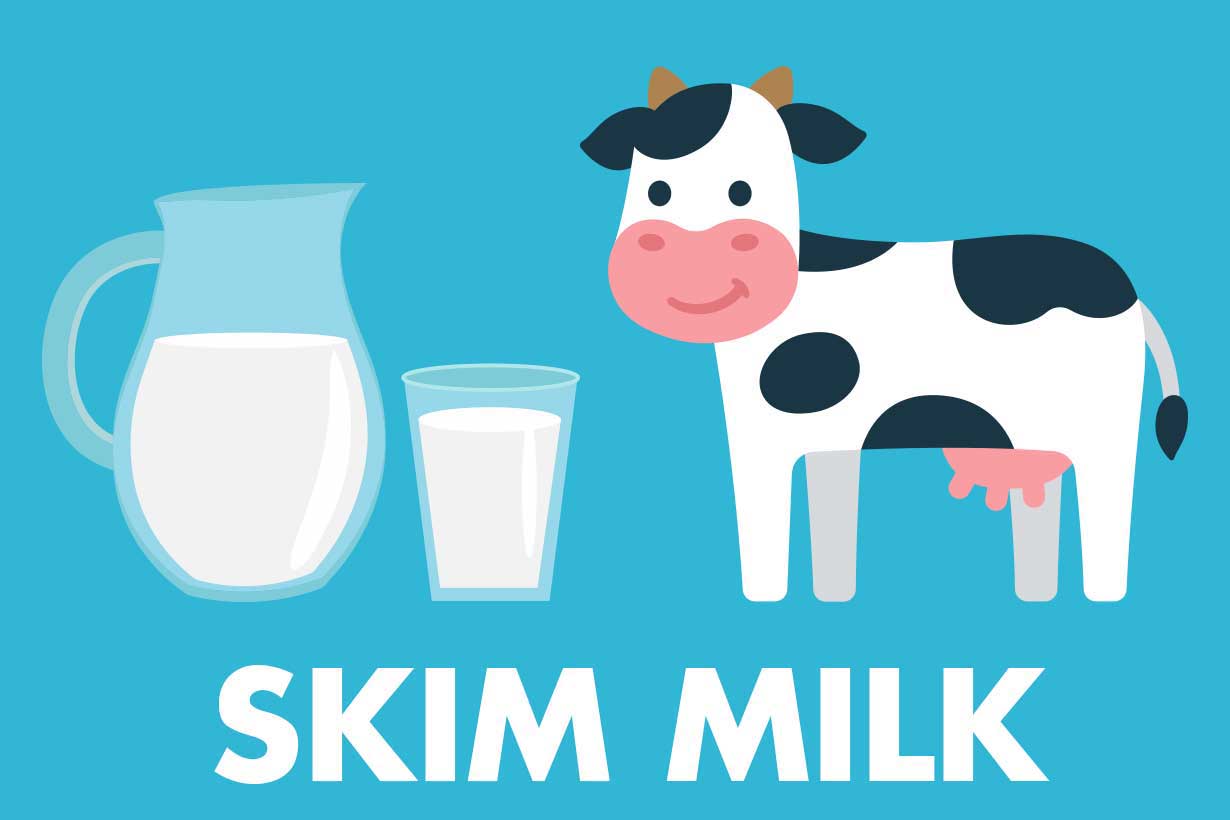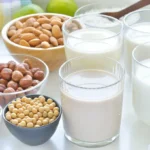Almond milk is one of the most popular plant-based milk options.
However, what does it offer nutritionally?
Does almond milk provide ample nutrients, and is it a good alternative to cow milk?
This article examines the nutritional properties of almond milk, how it compares to regular dairy, and findings from scientific studies.
Is almond milk good for you? Let’s take a closer look.
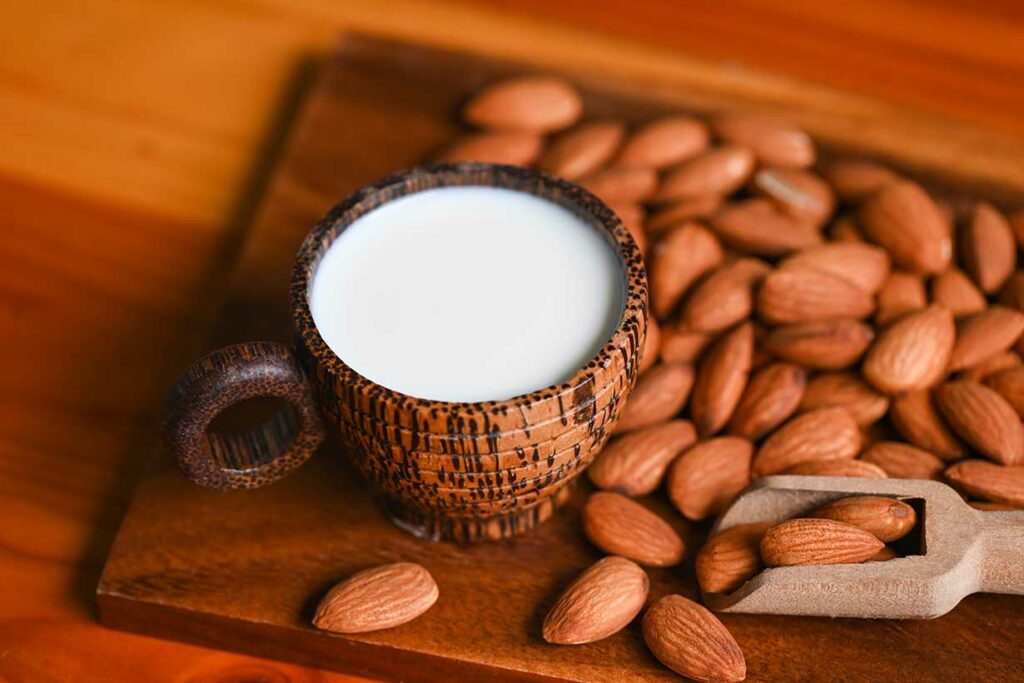
Table of contents
What Is Almond Milk?
Almond milk is a popular drink made from filtered ground almonds and water.
However, almond milk may also have some additional ingredients:
- Some varieties of almond milk are sweetened, and others are unsweetened
- Flavored almond milk options, such as banana and chocolate, are available
- Some almond milk products are fortified with vitamins and minerals, whereas some are not
Almond milk has a mildly sweet and nutty taste, with sweetened varieties having a less subtle and much sweeter flavor.
Like many plant-based kinds of milk, such as oat milk, almond milk is growing in popularity.
In 2021, the global almond milk market was worth an estimated $5.2 billion and was expected to grow by about 14% annually until 2025 (1).
According to the Almond Board of California, almond milk held a 77% share of retail sales for milk substitutes in the United States in 2021 (2).
How Is Almond Milk Made?
Commercially produced almond milk has a relatively simple production process.
The Food Science and Human Nutrition department at the University of Florida published an informative guide to this process.
Here is a simple summary:
- First: ground almond powder is heated in water at a temperature of 90°C (194°F).
- Second: any larger bits of almond are removed by centrifugation (a machine that separates solids from liquids via spinning).
- Third: the almond milk is treated by either pasteurization or ultra-high temperature (UHT) to kill any bacteria present.
Nutritional Values
As previously mentioned, there are numerous varieties of almond milk. For this reason, the nutritional values will vary depending on the exact type (sweetened/unsweetened, flavored/unflavored).
That said, here are the typical nutritional properties of unsweetened, fortified almond milk per cup (262g). The source of the nutritional data is the USDA’s FoodData Central database (3).
Daily values (% DV) have been calculated using the FDA’s recommended daily values based on a 2000-calorie diet (4).
| Name | Amount | % Daily Value (DV) |
|---|---|---|
| Calories | 39 kcal | |
| Carbohydrates | 3.43 g | 1.2% DV |
| Fiber | 0.52 g | 1.8% DV |
| Sugars | 2.12 g | |
| Fat | 2.5 g | 3.2% DV |
| Saturated | 0.21 g | 1.1% DV |
| Monounsaturated | 1.55 g | |
| Polyunsaturated | 0.63 g | |
| Protein | 1.05 g | 2.1% DV |
| Sodium | 189 mg | 8.2% DV |
| Cholesterol | 0 mg | 0% DV |
Vitamins
- Choline: 1.5% DV
- Folate: 0.7% DV
- Vitamin B2 (riboflavin): 2.3% DV
- Vitamin B3 (niacin): 1.1% DV
- Vitamin B5 (pantothenic acid): 0.6% DV
- Vitamin D: 1.3% DV
- Vitamin E: 110.5% DV
Minerals
- Calcium: 37.1% DV
- Copper: 5.6% DV
- Iron: 4.1% DV
- Magnesium: 3.7% DV
- Manganese: 4.3% DV
- Phosphorus: 1.9% DV
- Potassium: 3.7% DV
- Selenium: 0.5% DV
- Sodium: 8.2% DV
- Zinc: 1.5% DV
Almond Milk vs. Cow Milk
Is almond milk a good dairy alternative? That depends.
To answer this question, we should first examine how it compares to cow’s milk and what the drinker wants from their milk.
Firstly, the table below shows the respective calorie, carbohydrate, fat, and protein content in one cup of almond milk, whole cow’s milk, and skim cow milk (3, 5, 6):
| Name | Almond Milk | Whole Cow’s Milk | Skim Cow’s Milk |
|---|---|---|---|
| Calories | 39 kcal | 149 kcal | 83 kcal |
| Carbohydrates | 3.43 g | 11.3 g | 12.0 g |
| Fiber | 0.52 g | 0 g | 0 g |
| Sugars | 2.12 g | 11.7 g | 12.3 g |
| Fat | 2.52 g | 7.81 g | 0.2 g |
| Saturated | 0.21 g | 4.54 g | 0.12 g |
| Monounsaturated | 1.55 g | 1.68 g | 0.04 g |
| Polyunsaturated | 0.63 g | 0.26 g | 0.02 g |
| Protein | 1.05 g | 7.98 g | 8.37 g |
| Sodium | 189 mg | 92.7 mg | 100 mg |
| Cholesterol | 0 mg | 29.3 mg | 7.32 mg |
As we can see from the table, almond milk has significantly lower levels of calories, carbohydrates, fat, and protein.
Unlike dairy milk, almond milk contains no dietary cholesterol. It also has approximately double the sodium content of cow’s milk.
Regarding vitamins and minerals, it is essential to note that some varieties of almond milk are unfortified. The lack of fortification means that the milk will have significantly lower levels of vitamins and minerals than fortified varieties.
Thus, checking the label before purchase is necessary if looking for almond milk with higher levels of essential nutrients.
Studies Comparing Almond Milk To Dairy and Other Milk Products
We can also look at the results of a recently published study that compared the nutritional content of almond milk, other plant milk, and dairy milk.
Published in June 2022, the study looked at the nutrient composition of almond milk based on 12 different almond milk samples (7).
After analysis, it was determined that almond milk had significantly lower median calorie, carbohydrate, sugar, and protein levels. Additionally, almond milk (and all plant milk) had significantly lower levels of calcium, iodine, potassium, and vitamin B12 compared to dairy.
An earlier 2021 study noted that almond milk has less than half of the protein compared to dairy and soy milk. Although almond milk contained more calcium than other kinds of milk in the analysis, it had significantly lower levels of folate and vitamin B12 (8).
There was also an interesting observational finding from a study published on milk beverage consumption and childhood height in 2017 (9).
The study included 5034 healthy Canadian children aged between 24 months and 72 months old. 4632 children were cow milk drinkers, whereas 643 children were noncow milk drinkers.
Interestingly, there was a significant, dose-dependent difference in height between cow milk drinkers and noncow milk drinkers (9):
- Children were 0.1 cm lower in height per daily cup of noncow milk
- In three-year-old children, there was a significant height difference of 1.5 cm in those consuming 3 cups of cow milk per day compared to 3 cups of noncow milk
The researchers noted that further study is necessary to understand these relationships better.
Is Almond Milk a Good Dairy Alternative?
Whether almond milk is a good dairy alternative (or not) depends on the context and what each individual deems important:
- Dairy milk provides higher levels of protein, vitamins, and minerals than almond milk. If this is important (particularly for protein), then almond milk isn’t an adequate like-for-like nutritional replacement for cow’s milk.
- Almond milk is an excellent dairy alternative for individuals with lactose intolerance if protein content isn’t deemed important.
- Compared to whole milk, almond milk is much lower in calories, fat, and saturated fat. Therefore, if lowering energy intake and fat is a goal, then almond milk is a good alternative (so is low-fat dairy).
- For vegans who make an ethical choice to avoid dairy, almond milk might be a suitable replacement. However, if protein content is important, another plant milk (such as soy) would be a better option.
- Almond milk may also be a good dietary addition for people looking for a source of vitamin E since it contains significant amounts.
Benefits
Here is a summary of some of the main beneficial aspects of almond milk.
A Good Source of Vitamin E and Calcium
The recommended daily value for vitamin E, based on a 2000-calorie diet, is 15 mg daily (4).
Almond milk offers 16.6 mg of vitamin E per 262-gram cup, a substantial level of this essential nutrient, equal to 110% of the daily value per cup (3).
Among its numerous vital functions, vitamin E plays a crucial role in the immune system and protecting cells from damage (10).
Since dietary sources of vitamin E can be relatively hard to find, this is one of the key benefits of almond milk.
As previously mentioned, research has shown that almond milk also typically has higher calcium content than other plant milk (8). That said, as with any plant-based milk, it’s important to make sure it has been fortified with calcium—unfortified almond milk is not a good source of the mineral.
It Is Lactose-Free
Lactose is a simple sugar found in dairy milk.
However, lactose intolerance is a global issue, with a significant proportion of the population being lactose intolerant.
A 2017 systematic review and meta-analysis evaluated the prevalence of lactose malabsorption based on data covering lactose tolerance tests, genotyping, and breath tests (11).
The results found that approximately two-thirds of the world’s population have lactose malabsorption. Prevalence rates ranged from as high as >90% of the population in Somalia, South Korea, and Vietnam to as low as <10% of the population in Denmark, Sweden, and the United Kingdom.
Unlike regular cow’s milk, almond milk contains no lactose. As a result, it offers a lactose-free milk option for individuals with lactose intolerance.
Low In Saturated Fat
With only 0.2 grams per cup serving, almond milk contains minimal levels of saturated fat (3).
High saturated fat intake can raise low-density lipoprotein cholesterol (LDL-C) levels. Thus, reducing saturated fat intake can lower LDL-C (12).
Since LDL-C is significantly associated with an increased risk of cardiovascular disease, people with high levels may wish to lower their saturated fat intake (13, 14).
For this purpose, almond milk (or skim milk) is a simple way to lower saturated fat intake when replacing whole milk.
In this context, almond milk is a better choice than coconut milk, which also tends to be high in saturated fat.
Potential Downsides
Most foods have potential pros and cons, and almond milk is no different.
Here are some of the potential downsides of almond milk.
Low In Protein
As discussed earlier, almond milk contains only small quantities of protein.
For instance, a cup serving of almond milk provides only one gram of protein, eight times less than dairy milk (3).
For people who drink milk as a protein source, almond milk is an inferior nutritional choice to milk options such as dairy and soy milk.
Another plant-based milk worth consideration that offers higher protein levels is hemp milk.
Unfortified Almond Milk Is Low In Vitamins and Minerals
The fortification of almond milk with vitamins and minerals may vary from brand to brand.
Some versions may contain high calcium, vitamin D, and vitamin B12.
In contrast, other almond milk brands may be unfortified and thus very low in these nutrients.
If almond milk is a regular staple in the diet, it should be a fortified variety to better contribute to nutrient requirements.
A quick label check should show what vitamins and minerals the product has been fortified with.
Oxalate
Research has shown that almond milk has the highest oxalate (oxalic acid) content among commercial milk products (15).
This finding makes sense because almonds are recognized as one of the most oxalate-rich foods (16).
We can find oxalates in many different foods, and most people can usually consume them without issue. However, in rare cases, high intakes of oxalate can potentially be an issue for individuals prone to developing kidney stones (16, 17, 18).
Earlier research noted that the oxalate content of almond milk could range from 5.6 mg per 100 ml to 68 mg per 100 ml. This vast difference in oxalate content varied depending on the product, with homemade almond milk having the highest content (19).
Individuals currently on a low-oxalate diet or prone to kidney stones may wish to discuss almond milk with their medical team.
Tree Nut Allergies
Almonds are tree nuts, and tree nuts are one of the most common allergenic foods (20, 21).
A 2020 study published in the Annals of Allergy, Asthma, and Immunology journal found that the prevalence rate of tree nut allergy ranged from around 1% to 3% worldwide (22).
Almond milk is unsuitable for anyone with a tree nut allergy.
How To Make Almond Milk At Home
It may seem easier to buy ready-made almond milk in a store.
However, making homemade almond milk in the kitchen is quick and simple.
All the process requires is blending almonds with water until the liquid has a smooth consistency. At this stage, strain out lumpy bits using a fine mesh strainer (disclosure: affiliate link) for the smoothest consistency.
One cup of almonds to four cups of water is about right, but changing the number of almonds has some effects:
- Using more almonds gives a thicker consistency and increases the protein content, but it costs more money.
- Using fewer almonds leads to a thinner consistency, lowers the protein content, and saves money.
Final Thoughts
Almond milk doesn’t match up to dairy or soy milk for protein content and may provide lower vitamin and mineral levels.
However, it is an excellent source of vitamin E and can offer high levels of several essential nutrients when fortified.
Overall, almond milk can be a good milk option for those who enjoy the taste and don’t mind the lack of protein equivalence.

